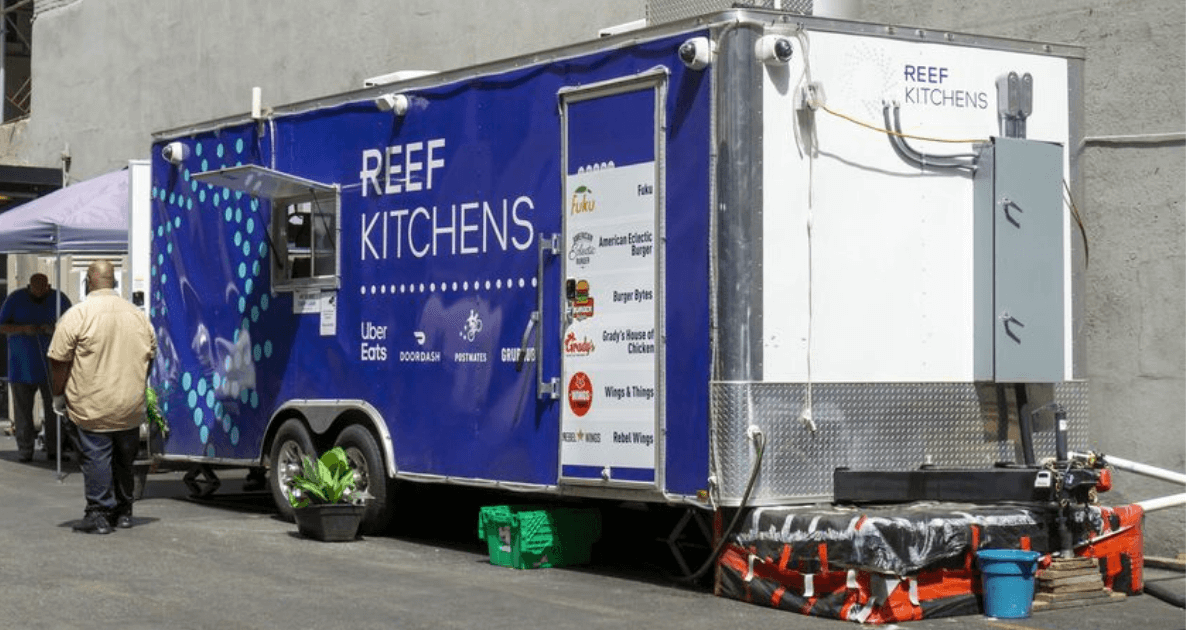Ghost Kitchens Gain a Taste for Licensing

Ghost kitchens grew rapidly during the pandemic as restaurants closed their doors, and they’re displaying a staying power and appetite for licensing.
Ghost kitchens take online orders and prepare the meals in kitchen-equipped trailers, central commissaries, or restaurants for delivery through the likes of Door Dash and Uber Eats. And while the success of ghost kitchens, like restaurants, hinges on the quality of the food, they are also proving to be a made-to-order means of brand recognition that can attract new consumers.
In some cases, restaurants are licensing their brand to a company like Reef Kitchens, whose parking lot-based trailers/kitchens prepare meals. In other cases, celebrity-based businesses like Virtual Dining Concepts (VDC) work with a cast that includes rapper DJ Khaled (Another Wing), singer Mariah Carey (Mariah’s Cookies), and YouTube star Jimmy “MrBeast” Donaldson’s (MrBeast Burger).
Wendy’s International—which has 6,949 full-serve restaurants in 31 countries, including 5,535 in the U.S.—is working with Reef to enter some urban markets with a delivery-only service. There are plans to open 150-200 locations this year. As part of the agreement, Wendy’s receives a 6% royalty on each sale of a meal, an increase from the 4% royalty typically collected from franchisees. Many of the ghost kitchen agreements carry 3-6% royalties on one- to three-year contracts, ghost kitchen executives said.
“It really works with existing brands because many of them have had years of experience in brand-building and licensing,” said Robbie Earl, president and co-founder of VDC, which works with DJ Kahled, Jimmy Donaldson (MrBeast Burger), chef Guy Fieri (Flavortown Kitchen), Nascar (Refuel), and Barstool (Barstool Bites). “It’s all about reaching new audiences and communities with new experiences.”
While many of the brands may come with an affiliation and fan base, it is the food that must deliver. That may mean developing a scaled-down version of a restaurant’s brick-and-mortar menu or creating offerings based on a celebrity’s culinary tastes. Most importantly, the food must remain authentic to the brand.
Nextbite—which works with comedian/actor George Lopez (George Lopez Tacos), and rapper Wiz Khalifa (Packed Bowls)—tests menu items for three to six weeks at its central kitchen in Denver, CO, said VP of licensing Brian Furano. And that’s in addition to taking three to six months to develop a bespoke brand, or one to three months for a limited-time offer like the “Smackadillas” virtual restaurant that was launched in the Dallas, TX area in March in advance of the World Wrestling Entertainment’s Wrestlemania 38.
“When a new [licensing] space emerges, every celebrity and IP owner may want their own version, but it’s not about who has the biggest following,” Furano said. “It takes spending time with the talent or brand and translating that into food.”
More than $3.5 billion has been poured into ghost kitchen start-ups, according to PitchBook Data. This money comes from tech-focused investors who are seeking the rapid growth seen with software companies and delivery apps like DoorDash. VDC completed a $20-million funding round last fall that included SoftBank (also an investor in Reef), which itself has raised $1.5 billion in three funding rounds and announced plans last November to open 150 locations with DJ Khaled in the U.S., U.K., Canada, France, and the United Arab Emirates. About 51% of U.S. households use delivery services, 25% of them on a weekly basis.
The ghost kitchens, some of which are being operated by the restaurant chains themselves in the case of Applebee’s (Cosmic Wing) and Chick-fil-A (Little Blue Menu), haven’t been without issues including health code violations and permitting problems, the latter since they fall somewhere between a food truck and sit-down restaurant. Reef has run into several issues and temporarily closed 95 underperforming locations last year.
“We do not think the market is saturated at all,” said Ross Misher, CEO of Brand Central. Brand Central is working with Reef, VDC, and Nextbite to develop concepts for virtual dining based on the equity of those brands. “In fact, we think this is only the beginning. Ghost kitchens will become a new way for brands to deliver exciting food products from the grocery and retail shelves right onto peoples’ dining room tables in a transformative way.”




